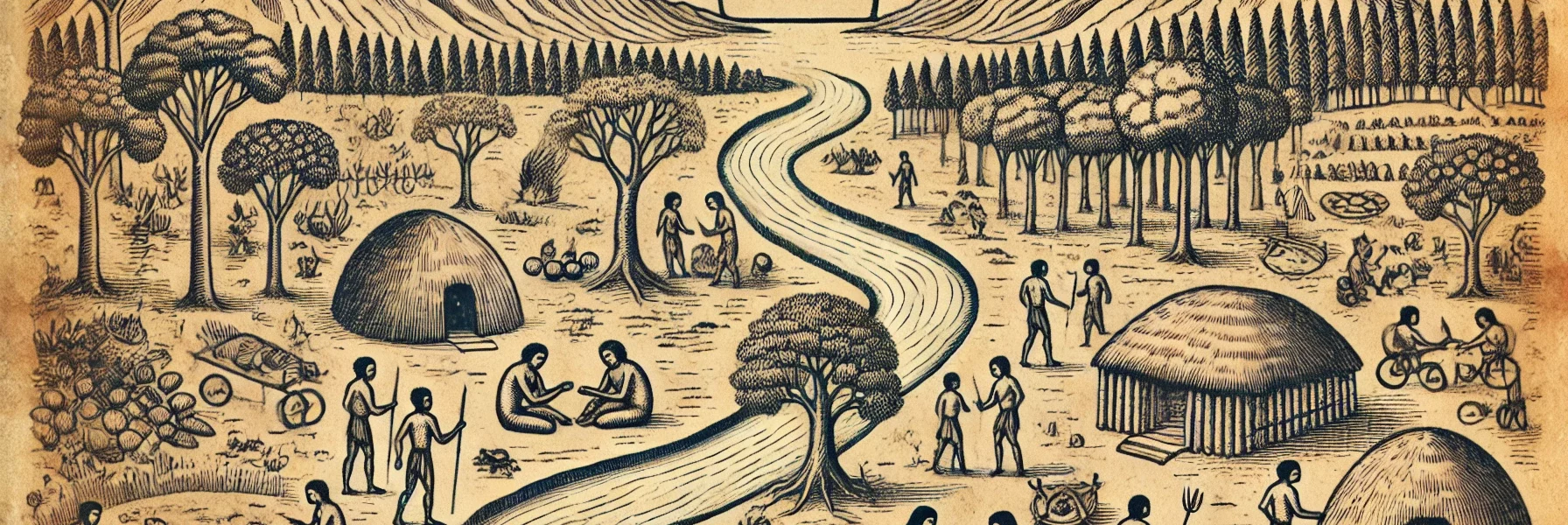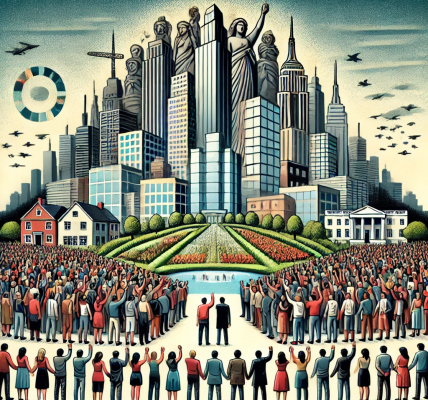Almost all disciplines, be it psychology, nutritional science, or quantum physics, suffer from the reduction of their complex theories and findings into oversimplified, often misinterpreted aphorisms, slogans, or ‘fun facts’ that permeate everyday conversations. Such a phenomenon is attributable to academics themselves as much as it is to the general public, though that will not be the topic of discussion here. I was instead urged to write this piece, as I have regularly come across a similar process of oversimplification within the discourse on the history of political and economic ideology where there seems to be a tendency to label all sorts of past civilizations as examples of “early socialism” that pertained to “communistic values”. Numerous academics and researchers for instance, have referred to Indigenous societies in the Americas (e.g. the Inuit, Pueblo people, Chachapoyas), Neolithic societies in western Europe, west Africa, Anatolia, and Southeast Asia (e.g. ancient Gaelic communities, Wolof people, Çatalhöyük, the Andamanese), and even to early Christian, Jesuit or Mazdak-Sasanian settlements as ‘proto-socialist’, ‘primitive communist’, ‘religious communist’ or ‘reminiscent of utopian socialism’.
I will not be challenging specific claims of egalitarianism or primitive communism, but will rather attempt to deconstruct and question the underlying system of thought beneath the claims themselves. In two parts, I will demonstrate complexities and problems that come with using a Marxist lens in such an anachronistic manner and projecting an essentialized idea of ‘egalitarian living’ as I believe it (1) risks oversimplifying, narrativizing, and possibly misrepresenting human history in an attempt to ‘explain’ it, while failing to detach itself from political implications as well, and (2) neglects or further complicates the intricate definitions and underpinnings of Marxist thinking, thereby fostering an environment for muddled, confounding discourse on socialism/communism altogether.
‘Origins’ of the Claims of Primitive Communism and its Politics
“How happy was the primitive age when the bounties of nature lay in common…They held all nature in common which gave them secure possession of the public wealth”
— Lucius Annaeus Seneca
The belief that humans once lived in a harmonious and ‘morally untainted’ state in accordance with nature, is a tale as old as time. While conceptions like Arcadia and the Garden of Eden have most likely propagated such beliefs, Jean Jacques-Rousseau’s (in)famous archetype of the ‘Noble Savage’, and the early anthropological representation of life in Indigenous and Aboriginal societies as untouched by notions like selfishness or corruption, have surely solidified them.
In modern anthropology, much of the perpetuation of this ‘myth’ is attributable to Marshall Sahlins and his writings on The Original Affluent Society in the 1960s. Sahlins (2020) argued that hunter-gatherer societies achieve ‘affluence’ not through the accumulation of material wealth but through a lifestyle in which their basic needs are met with minimal labour. According to Sahlins, hunter-gatherers followed what he called the “Zen road to affluence”, characterised by desiring little and meeting those desires with the resources immediately available to them, thus not having the incentive to work ‘hard enough’ to create surplus, as there is no apparent way to make use of it or store it (2020). Sahlins also sought to compare his findings of a ‘good life’ painted by ‘affluence without abundance’ which allowed for great leisure time, to the life of ever-expanding desire, production and material excess of ‘Western’ societies with minimal time for leisure. Sahlins’ findings were later criticised for a multitude of reasons1, an essential one being that he had chosen ‘cherry-picked’ examples of hunter-gatherer societies fitting his theories when plenty of ‘primitive’ societies (the Trobriand Islanders for example) had yamhouses full of mountains of rotting food, as their idea of a ‘good life’ consisted of abundance to the point of excess.
Regardless, Sahlins’ initial stance will soon present itself to be quite ironic, as he and his student David Graeber, would later become some of the main critics of such ways of thinking, that is, painting the life of ‘primitive societies’ as universally any one way, be it subsistent, surplus-oriented, egalitarian, hierarchical, anarcho-violent, so on… (see the section “An Anthropological Evaluation”).
Still, the assertion that the social and material organisation of early humans resemble communism, (even the subsequent wave of a new philosophy/methodology in social sciences called ‘Marxist anthropology’ and ‘Marxist archaeology’), is largely attributable to Karl Marx and Friedrich Engels themselves, and their interpretation of Lewis H. Morgan’s Ancient Society (1877).
What the German thinkers concluded was this: the birth of private property (and thus the beginnings of inequality, exploitation, and class conflict), came with humans’ transition to agriculture – the first instance of hoarding capital and managing surplus (Engels, 1988). Since early humans relied on subsistence-level production before the ‘agricultural shift’, and ‘shared’ all resources, their societies lacked private property, class-conflict, and could largely be considered egalitarian according to Marx and Engels. Hence, the term ‘primitive communism’ was conjured by the two philosophers, to describe the initial stage of social development: a hunter-gatherer lifestyle that simulates the known socialist ethos of: “From each according to his ability, to each according to his needs”.
Any claim that depicts an ‘original’ or ‘initial’ state of human political and economic organisation carries significant weight, as any claim regarding the ‘origins’ and thus the ‘nature’ of humankind (e.g. co-operative vs. selfish, egalitarian vs. prone to hierarchy), can act as a foundational claim for how humankind ought to operate, that is, closer to its ‘nature’. Of course, such would require certain ontological and axiological acceptances that there is a ‘nature’ of humankind (specifically relating to its social organisation), and that because it is ‘natural’, it is what humans should strive to return to.
I believe Marx and Engels’ use of primitive communism is riddled with such (often unnoticed) acceptances ultimately functioning as invisible arguments that propose communist living to be the ideal, and to have always been the ideal. Both conceptually and grammatically, the philosophers portray the first and final stages of ‘social progress’—primitive communism and communism respectively—as reflections of each other. By claiming that pre-agrarian societies lacked private property, state, and thus concepts like class and class conflict, primitive communism mirrors the post-revolution communist image, albeit an Edenic version of it. As noted earlier, the agricultural revolution acts as the primordial sin in this case (and an explanation for why inequality, alienation etc. exist today), representing the destruction of ‘perfect egalitarian order’ or simple subsistence living, with the introduction of private property and resource hoarding. Communism, then, merely appears as a reconstruction of the ancient order insofar as its promise to dismantle the concepts of private property and class while simultaneously aiding us in regaining the fulfillment and ‘human-ness’ that has been lost along the way in our ascent up the ladder of ‘progress’. This narrative not only presents a poetic resolution, where the ideal social organisation we chased all this time, was one that we had (sort-of) achieved long ago, but it also presents a hopeful case for class society, inequality, and exploitation not being inherent to human nature but rather products of our own initial ‘blunder’, rendering them conquerable problems contrary to the Hobbesian acceptance of humans as naturally selfish, competitive, and inherently drawn to systems of hierarchy.
I do not suggest that Marx and Engels specifically intended for a rhetorical tool when creating the term primitive communism, nor that the use of rhetoric necessarily invalidates the anthropological claims they make, though I suppose it is useful to understand why the term possesses such great emotional and intuitive appeal, and why the image it creates certainly sticks with people. Additionally, I believe that Marxist historians’ insistence on using terms such as ‘proto-socialism,’ ‘religious communism,’ and ‘primitive communism’ to describe supposedly egalitarian societies, is not merely an attempt to categorise historical forms of social organisation but to, again, subtly suggests that communistic living is not just an eventual historical outcome, but one that societies once achieved in certain ways, and should strive to return to. Otherwise, I frankly do not see a point as to why terms like egalitarian-living are used as if they are interchangeable with proto-socialism or primitive communism, where doing so harms none other than Marxists themselves (see the section “An Ideological Evaluation”).
An Anthropological Evaluation
I have so far attempted to define and contextualise the term ‘primitive communism’, and convey the vaguely convincing, yet romanticised visage it creates in the minds of readers. It will hopefully be more clear in this next section that; while appearing to be grounded in theories of anthropology and historical materialism, many of the assumptions of the intellectual framework of primitive communism are no less limiting and problematic than that of Rosseau, Seneca (a reference to his quote), or any other purely ‘reminiscent’ thinker—that is, reminiscent of an Edenic past. Yet, similar trends that cling on to a historically and universally egalitarian image of humanity, continue in anthropology and ‘pop-anthropology’ today in the form of an ‘origins of inequality’ model for analysing human history. In other words, much of the writings on the history of humans, of political and economic organisation, and that of the state, has largely been focused on providing explanations for how we came to lose the initial primitive egalitarian living conditions we once ‘had’, and why/how the agricultural revolution, thus the subsequent formation of civilization, was in countless ways a ‘trap’ (following the works of Yuval Noah Harari, Jared Diamond, and Francis Fukuyama).
A more newly emergent current in the study of the history of human political and economic organization challenges this model. Figures like Sahlins, and more significantly his student Graeber, have called for a shift in anthropology characterized by themes of political diversity, agency, and a commitment to moving beyond ‘grand narratives’ of orderly, rigidly classified human development, and urging scholars to ask the ‘more interesting’, idiographic questions.
In their acclaimed book The Dawn of Everything, David Graeber and David Wengrow lay the foundations for this approach by arguing that there was no ‘overnight’ shift to agrarian living. They contend that the so-called ‘agricultural revolution’ was far from a uniform transition, with early societies often resisting such changes and demonstrating remarkable political creativity and agency, allowing them to experiment with various forms of social and material organization, shaped by seasonal, practical, spiritual, or other factors, resulting in alternating combinations of hierarchical, egalitarian, agrarian, and hunter-gatherer arrangements (Graeber & Wengrow, 2022). By association, Graeber and Wengrow note that egalitarian living is not limited to the confines of communal, pre-agrarian societies, and nor are practices of hierarchy and dominance limited to agrarian, populated, societies as Marx, Engels, Harari, and others suggest (2022). The point is, human history is non-uniform as much as it is non-linear. It is then reasonable to put forward that those who can not control the urge to reduce the diverse and complex social organisation of past societies into a universal category of ‘egalitarian living’, risk overlooking the deep, distinctive historical and cultural currents that shape human behaviour, hence human history. Let us look at a fascinating example that illustrates the varying ways-of-living past societies had, and how an ‘egalitarian-hierarchical’ binary, can sometimes fall apart, or cast a shadow on more interesting layers of social analysis.
In another one of his books, On Kings, Graeber, together with Sahlins presents a unique case of how countless ‘seemingly egalitarian’ societies of Papua New Guinea, The Americas, Africa, and Asia, all inhibit similar spiritual and cosmological systems that enforce a sense of hierarchy, control, and subjection not unlike those observed in a political state. The authors cleverly suggest that the existence of a kind of ‘state’, and subsequent relations of dominance, are not limited to the material sphere of humans and objects, simply because there is no divide between the ‘natural’ and ‘supernatural’ in the way of living, and believing of these societies (Graeber & Sahlins, 2017). Though characterised by a lack of political or social “leaders of any kind”, the existence of ‘spirits’ or ‘divinities’ is integrated with the daily lives of these social groups in varying ways, and such “meta-persons” do not always exhibit reciprocal or egalitarian relationships with humans, but can mandate “cosmic rules” that befit a king, not excluding visits of illness, misfortune or even penalty of death (2017). Egalitarianism, in this sense, is not just a social or economic arrangement concerning ideals of equal material wealth and equal say in processes of decision-making, but rather a reflection of the state of being equal under the subordination of a feared and revered divine power, and the cosmic law it extends. In other words, members of some of these societies are only ‘equal’ in comparison to the grand order of the spiritual beings that completely tower over them (2017).
The relevancy of Graeber and Sahlins’ findings are their direct demonstration of the sheer diversity of early societies, and the difficulty of consistently and clearly defining ‘egalitarian living’. The term itself is used so loosely in-fact, even early medieval societies that very well do have forms of hierarchy and state, and do rely on agricultural production—which runs completely counter to Marx’s depiction of egalitarianism—have been labelled as egalitarian by academics, simply for practising mutual aid or apostolic poverty (conflating private vs. personal property distinctions along the way). In such cases, analyses of egalitarianism can simply feel quite self-important or overly conclusive, triumphing over valuable historical and anthropological inquiry regarding superstition, kinship, morality, etc., that can provide a more complete and profound understanding of social dynamics. To achieve this greater understanding, an attitude of ‘historical empathy’ when trying to make sense of past societies, that is, making sense of the cultural context that shapes the subjective ways of thinking and behaving of historical actors, is a must – à la Max Weber (Walker, 2014). It would in no way be reasonable to constrain, for example, the gift economies of Polynesian societies that are riddled with acts of ritual, mythopraxis, and deep bonds of kinship, into a generic conception of egalitarianism guided by vague interpretations of reciprocity, when the ‘lifeworlds’ and motivations of these social actors are incredibly complex and likely quite dissimilar to other supposedly egalitarian societies of varying historical and geographic origins.
An Ideological Evaluation
Beyond the problems of the usage of egalitarianism in economic anthropology, is using it synonymously with terms such as early-communism or proto-socialism and the sorts. At the core, communism must be understood as a response to none other than the capitalist mode of production, which in many ways, shapes the necessary conditions for a proletariat revolution to take place to begin with. In other words, communism does not just come about, but must exist as a direct historical successor of capitalism.
The primary reason, which Marx himself recognized in the majority of his writings (despite entertaining the possibility of transitioning the non-industrialized Obshchina system of Russia into a socialist economy in his letters to Vera Zasulich towards the end of his life), is that the productive sustenance of a future communist society, relies on the preceding inventions of, and the aggregate wealth generated by capitalism, which in his words, has created “more massive forces of production than all other preceding generations put together”, freeing populations from the “idiocy of rural life” and the chains of “feudal and patriarchal relations” (Marx & Engels, 2011). The secondary reason of course, is that Marx believed the proletariat class had to become aware of the collective suffering they endure under capitalism, to recognize their position as the opposers of the bourgeoisie in both conditions and interests, to then radicalise, unionise and revolt (i.e. to reach ‘class consciousness’). The collective suffering Marx refers to can be summarised as:
- An unequal distribution of, and access to wealth due to the bourgeoisie’s ability to exploit the working class (drive profit from surplus value), to accumulate capital, and to privately own the means of production—thus dictate working conditions
Consequently:
- The proletariat life being characterised by a lack of agency, opportunity, change—a state of fait accompli and structural domination, as well as the estrangement of man from self-edifying aspects of labour (as unskilled monotone labour presents no creativity, self-realisation and self-transformation), thusly estrangement from his ‘species-being’ (‘human nature’) altogether.
Marx neatly captures this obscure description of both material and spiritual suffering, all within the term ‘alienation’, and stresses that the proletariat class embodies such alienation in its most acute form under capitalism, indicating that their suffering creates the necessary conditions for the revolution, as the radicalization and unity of workers must come from the rechanneling of said suffering. Even if one were to reject an interpretation of Marx’s theory of historical materialism as a rigid sequence of various successive transitions (eg. feudalism → capitalism → communism), it can not be denied that communism must be built on top of the material and ideological ‘ruins’ of capitalism as the latter ‘creates’ the social actors that will be participating in the revolution, as well as the ‘reasons’ for the revolution to occur, and finally the wealth/capital to be redistributed. None of this, I imagine, is unfamiliar to the Marxist theorist.
What should then be, to put it bluntly, quite obvious, is that there is a fundamental difference between supposed ‘primitive egalitarian’ and communist societies, grounded in distinct historical and economic conditions that give rise to each system, rendering the two, incommensurable. It follows, that referring to complex societal structures or spiritual communities as “communist-like” is not only an ideological and ethnocentric projection that simplifies social history, but is also a dilution of the specificity of Marxist theory, cheapening a comprehensive social, political, and economic system with necessary historical and theoretical foundations, to visages of utopic communitarian living, or the mere ethos of ‘sharing’. This is an odd hill to die on, as many of the colloquial criticisms of Marxism are based exactly on similar (mis)understandings like: “Communism is when you share everything”. I would have imagined that Marxists, who constantly defend their doctrine against such strawman critiques, would not willingly obfuscate the core principles of said doctrine, by accepting ‘fuzzy’ interpretations of ‘private’ and ‘communal’ relations of ownership and production, that reduce all forms of living into a capitalist-communist binary much like an egalitarian-inegalitarian one. In said cases, a Marxist lens of analysis often ‘finds’ exactly what it ‘looks for’, focusing on either the presence or absence of capitalism and its ‘associated traits’, rather than providing a nuanced, hermeneutic understanding of the society in question, even though most societal traits—be it hierarchy or redistribution—are not exclusive to any one ideology, and may not exactly belong to any modern ideology at all.
Closing Statements
The purpose of this piece is not to engage in petty semantic debates but to offer a substantive critique of how ideologically loaded frameworks can conceal more than they reveal. The imaginaire of early-humans-as-egalitarian is an internally confused idea, as the supposed model egalitarian society across literature, seems to range from small hunter-gatherer tribes that simply share their hunts and are only concerned with subsistence; to slave-owning2 societies that have democratic, even matriarchal principles; or agrarian, religious communities that practice apostolic poverty, so on. All such examples pertain to noticeably different modes of living, some of which occupying different ‘developmental positions’ in the human timeline, which wildly complicates what egalitarianism really is or what it looks like ‘in practice’.
Secondly, it does not seem clear why an egalitarian label matters, or why it is analytically useful for the specific society being examined… Instead of inciting further discussion, labels of egalitarianism act as the be-all and end-all of social analysis, drawing attention to the weight of the term itself, instead of the underlying social functions of the society, thereby clouding other points of analysis. Thirdly, such labels become even more confusing and induce significant damage to both the term itself and others along the way, as well as to ideologies or anthropological analysis in general, when carelessly substituted with Marxist phrases in writing, despite having clear logical and conceptual differences. Lastly, and perhaps tying together the three previous points, there remains a significant lack of transparency—or rather reflexivity—in the usage of terms like “egalitarian” or “primitive communism.” What underlying axiological, aesthetic, historical, or psychological assumptions are embedded within such analyses, and why are these often implied rather than explicitly stated? Are there value judgments at play about what constitutes an “ideal” society, shaped by contemporary ideologies or personal biases? Are there aesthetic preferences for simplicity or harmony that unconsciously influence the framing of early societies? Psychologically, do these analyses project a yearning for lost innocence or a need to impose coherence on the chaotic complexities of the past?
It should also be noted, as Graeber and Wengrow have pointed out, narratives of a ‘fall’ from egalitarianism, as seen in the framing of the agricultural revolution, often reinforce the very Hobbesian worldview they seek to critique. By framing progress as a sort of ‘deal with the devil’ where equality is sacrificed for civilization, they implicitly accept that the two are incompatible. This framing not only limits our understanding of the past but also constrains our imagination for the future. In contrast, Graeber and Wengrow’s depiction of a diverse, adaptable, and politically pragmatic humanity offers a more hopeful, meticulous, and idiographic framework. Relatedly, historically empathetic and precise use of language respects the complexity of human societies and honors the diversity of their lived experiences. There is no need to search the distant past for communist ideals or practices; more recent history provides ample material for reflection without distorting the reality of pre-capitalist societies or their diverse modes of organization.
Notes:
- Sahlins was criticised of miscalculating realistic time-effort relationships in ‘primitive societies’, undermining violence and unpredictability within subsistent hunter-gatherer societies, having poorly defined, limited categorizations/definitions of ‘work’, ‘leisure’ (since such a divide did not clearly exist in hunter-gatherer societies) and especially conceptualising surplus as a purely material concept, thereby negating the existence of prestige economies or socially affluent uses of excess capital in gift-economies for example. ↩︎
- This does not refer to ‘slave-society’ in the Marxist sense (i.e. the ‘Ancient Mode of Production’ or Pre-Feudal society) like in the case of the Greeks and Romans
↩︎
References:
- Engels, F. (1988). The origin of the family, private property and the state: In the light of the researches of Lewis H. Morgan (Repr). Lawrence & Wishart.
- Graeber, D., & Sahlins, M. (2017). On kings. Hau Books.
- Graeber, D., & Wengrow, D. (2022). The dawn of everything: A new history of humanity. Penguin Books.
- Marx, K., & Engels, F. (2011). The communist manifesto. Penguin Books.
- Morgan, L. H. (1995) Ancient society. (2. print.). Tucson, Ariz: University of Arizona Press.
- Sahlins, M. (2020) Stone Age Economics. (1st ed.). Routledge doi:10.4324/9781003058762.
- Walker, K. (2014). Sociology reference guide. Early theorists & the science of society. Salem Press. p. 123-132






